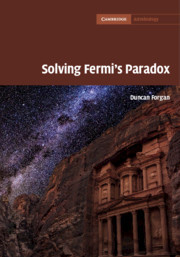Description
Solving Fermi's Paradox
Cambridge Astrobiology Series
Author: Forgan Duncan H.
An introduction to the search for extra-terrestrial intelligence through the lens of Fermi's paradox, discussing methodology and potential solutions.
Language: English
Subject for Solving Fermi's Paradox:
Approximative price 169.65 €
In Print (Delivery period: 14 days).
Add to cart
Publication date: 05-2019
426 p. · 17.8x25.2 cm · Hardback
426 p. · 17.8x25.2 cm · Hardback
Description
/li>Contents
/li>Biography
/li>
The search for extra-terrestrial intelligence (SETI) has for sixty years attempted to solve Fermi's paradox: if intelligent life is relatively common in the universe, where is everybody? Examining SETI through this lens, this volume summarises current thinking on the prevalence of intelligent life in the universe, and discusses sixty-six distinct solutions to the so-called paradox. It describes the methodology of SETI, and how many disciplines feed into the debate, from physics and biology, to philosophy and anthropology. The presented solutions are organised into three key groups: rare-Earth solutions, suggesting planetary habitability, life and intelligence are uncommon; catastrophist solutions, arguing civilisations do not survive long enough to make contact; and non-empirical solutions, those that take theoretical approaches, such as that our methodology is flawed. This comprehensive introduction to SETI concludes by looking at the future of the field and speculating on humanity's potential fate.
Preface; Part I. Introduction: 1. Introducing the paradox; 2. Fact A – the great silence; 3. Classifying scenarios and solutions to the paradox; Part II. Rare Earth Solutions: 4. Habitable worlds are rare; 5. Life is rare; 6. Intelligence is rare; Part III. Catastrophist Solutions: 7. Doomsday arguments; 8. Death by impact; 9. Death by terrestrial disaster; 10. Death by star; 11. Death on a galactic scale?; 12. Death by unsustainable growth; 13. Death by self-induced environmental change; 14. Self-destruction at the nanoscale; 15. Artificial intelligence and the singularity; 16. War; 17. Societal collapse; Part IV. Uncommunicative Solutions: 18. Intelligent life is new; 19. Exploration is imperfect; 20. Probe exploration is dangerous; 21. The aliens are quiet; 22. They live too far away; 23. The zoo/interdict hypothesis; 24. The simulation hypothesis; 25. They are already here; 26. They were here long ago; Part V. Conclusions: 27. Solving Fermi's paradox; Appendix A. A database of solutions to Fermi's paradox; References; Index.
Duncan H. Forgan is Associate Lecturer at the Centre for Exoplanet Science at the University of St Andrews, Scotland. He is a founding member of the UK Search for Extra-terrestrial Intelligence (SETI) research network and leads UK research efforts into the search. His work includes simulations of civilisation evolution, developing observables of intelligence and policy for post-detection scenarios.
© 2024 LAVOISIER S.A.S.

